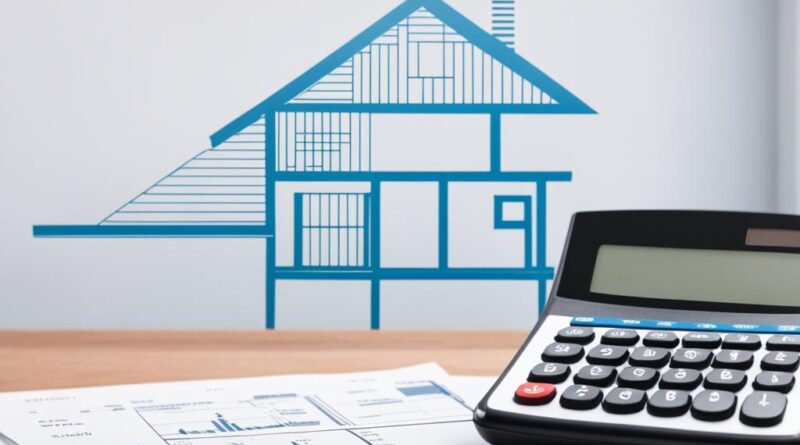Repiping Cost Calculator for Your Home
Are you considering repiping your home’s water supply lines? It’s important to have a clear understanding of the potential costs involved. Repiping a house can vary in price depending on several factors, such as the size of your home, the materials used, and the number of fixtures. To get an accurate estimate tailored to your specific property, you can utilize a house repiping cost calculator.
Key Takeaways:
- Costs for repiping a house can vary depending on factors like the size of the house, materials used, and number of fixtures.
- Using a house repiping cost calculator can provide an accurate estimate for your specific property.
- Factors that affect repiping costs include the size of the home, the number of plumbing fixtures, the location of the pipes, and the type of pipe material used.
- It is recommended to hire a professional plumber for repiping projects to ensure the job is done correctly and to code.
- Repiping a house offers benefits such as improved water quality, increased water pressure, and prevention of costly water damage.
Factors Affecting Repiping Costs
When considering the cost to repipe a house, several factors come into play. Understanding these factors can help you estimate the expenses involved and make informed decisions. Here are some of the key factors that can affect the cost of repiping:
1. Size of the Home
The size of your home plays a significant role in determining the cost of repiping. Larger homes require more materials and labor to complete the repiping project, resulting in higher costs.
2. Number of Plumbing Fixtures
The number of plumbing fixtures in your house, such as faucets, toilets, and showers, can impact the overall repiping cost. Each fixture requires connections to the water supply lines, increasing the complexity of the project and the associated expenses.
3. Location of the Pipes
The accessibility and location of the existing pipes can affect the cost of repiping. If the pipes are easily accessible, the labor required for installation or replacement is reduced, resulting in lower costs. However, if the pipes are located within walls or under floors, additional labor and material may be needed, increasing the overall expenses.
4. Type of Pipe Material
The choice of pipe material can also impact the repiping cost. Different materials, such as copper or PEX, have varying price points. Copper pipes are generally more expensive but offer durability and longevity, while PEX pipes are a more affordable option with flexibility and ease of installation.
By considering these factors, you can get a better estimation of the cost to repipe your house. However, it is always recommended to consult with a professional plumber and use a house repiping cost estimator for a more accurate assessment.
Note: The image above showcases the importance of using a house repiping cost estimator to get an accurate estimation of the repiping expenses.
Average Cost per Job
When considering repiping your house, one of the most important factors to consider is the cost. On average, the cost to repipe house water supply lines is approximately $3,602 per job. However, it is crucial to note that this is just an average, and the actual cost can vary depending on various factors, such as the size of the house and the complexity of the project.
Some contractors may charge based on the square footage of the house, with an average cost ranging from $4 to $6 per square foot. To get a more accurate estimate for your specific repiping project, it is highly recommended to use a repiping cost calculator. This tool takes into account the unique characteristics of your house and provides you with a more tailored cost estimate.
By using a repipe house cost estimator, you can have a better understanding of the potential expenses involved in repiping your home. It enables you to plan your budget accordingly and ensures that there are no surprises along the way. Investing in the accurate estimation of repiping costs can save you both time and money in the long run.
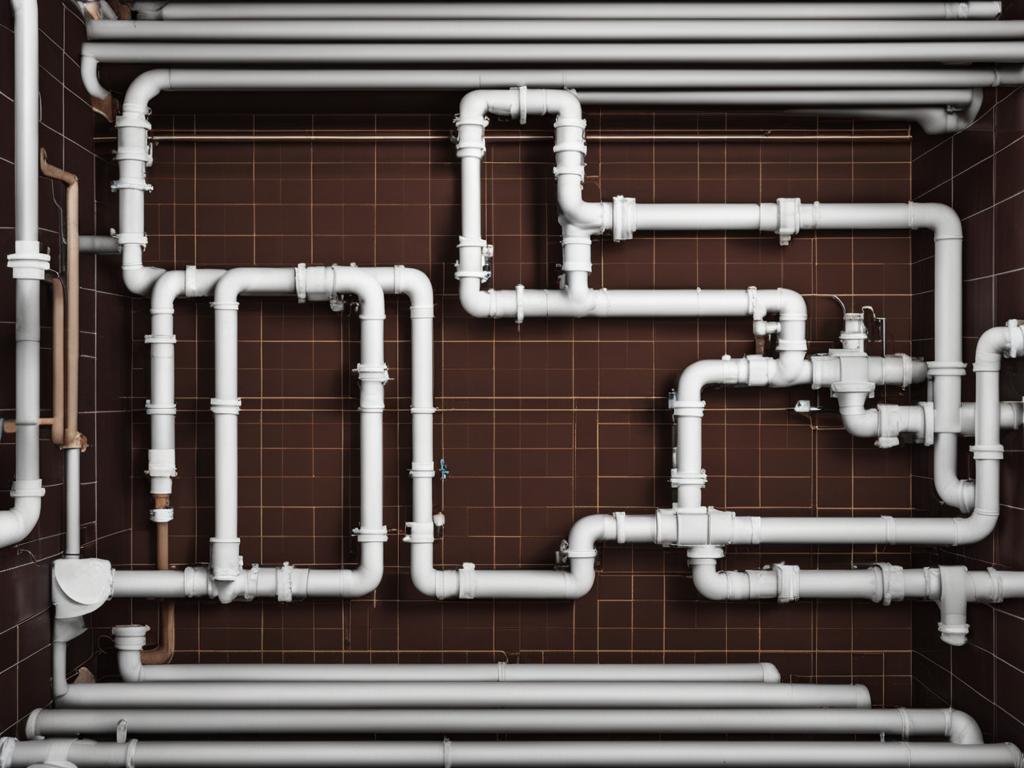
| Factor | Average Cost |
|---|---|
| Cost per job | $3,602 |
| Cost per square foot | $4 – $6 |
Materials and Labor Costs
The cost of repiping a house includes both materials and labor. When calculating the house repiping cost estimator, it’s important to consider the expenses associated with the necessary materials such as pipes, fittings, and connectors. These materials typically account for a portion of the total cost of repiping.
The exact cost of materials can vary depending on factors such as the size of the house, the type of piping material selected, and the number of plumbing fixtures. For a more accurate estimate tailored to your specific needs, consider consulting with a professional plumber or using a house repiping cost calculator.
In addition to materials, labor costs also contribute to the overall repipe my house cost. The complexity of the repiping job and the plumber’s hourly rate can impact labor expenses. It’s recommended to obtain quotes from multiple contractors to compare prices and ensure you are receiving a fair estimate.
Here is an example breakdown of the materials and labor costs for repiping a house:
| Expense | Cost Range |
|---|---|
| Materials | $1,500 – $3,000 |
| Labor | $1,500 – $4,000 |
Keep in mind that these cost ranges are just for illustrative purposes and can vary based on several factors. It’s always advisable to consult with a professional plumber to get an accurate estimate for your specific repiping project.
By understanding the materials and labor costs associated with repiping, you can better prepare for the financial aspects of your project and make informed decisions about hiring contractors and selecting materials.
Types of Pipe Materials
When it comes to repiping your home, there are several pipe materials to consider. The choice of pipe material can have an impact on both the cost and the overall performance of the repiping project. Let’s take a closer look at the different types of pipe materials commonly used:
Copper
Copper pipes are known for their durability and reliability. They have been used for many years in plumbing systems and are resistant to corrosion. However, copper pipes are also the most expensive option, making them less cost-effective for some homeowners.
CPVC
CPVC (Chlorinated Polyvinyl Chloride) pipes are a popular choice for repiping due to their affordability and resistance to corrosion. They are easy to install and maintain, making them a practical option for many homeowners. CPVC pipes are also known for their versatility and can be used in both hot and cold water applications.
PEX
PEX (Cross-linked Polyethylene) pipes are gaining popularity in the repiping industry due to their flexibility and ease of installation. PEX pipes are highly resistant to freezing and bursting, making them ideal for colder climates. They are also corrosion-resistant and have a longer lifespan compared to some other pipe materials.
Each pipe material has its own set of advantages and considerations. The choice should be based on factors such as budget, specific needs, and the recommendations of a professional plumber.
| Pipe Material | Pros | Cons |
|---|---|---|
| Copper | Durable and reliable | Expensive |
| CPVC | Affordable and corrosion-resistant | May not be suitable for high-temperature applications |
| PEX | Flexible and easy to install | May not be suitable for outdoor applications |
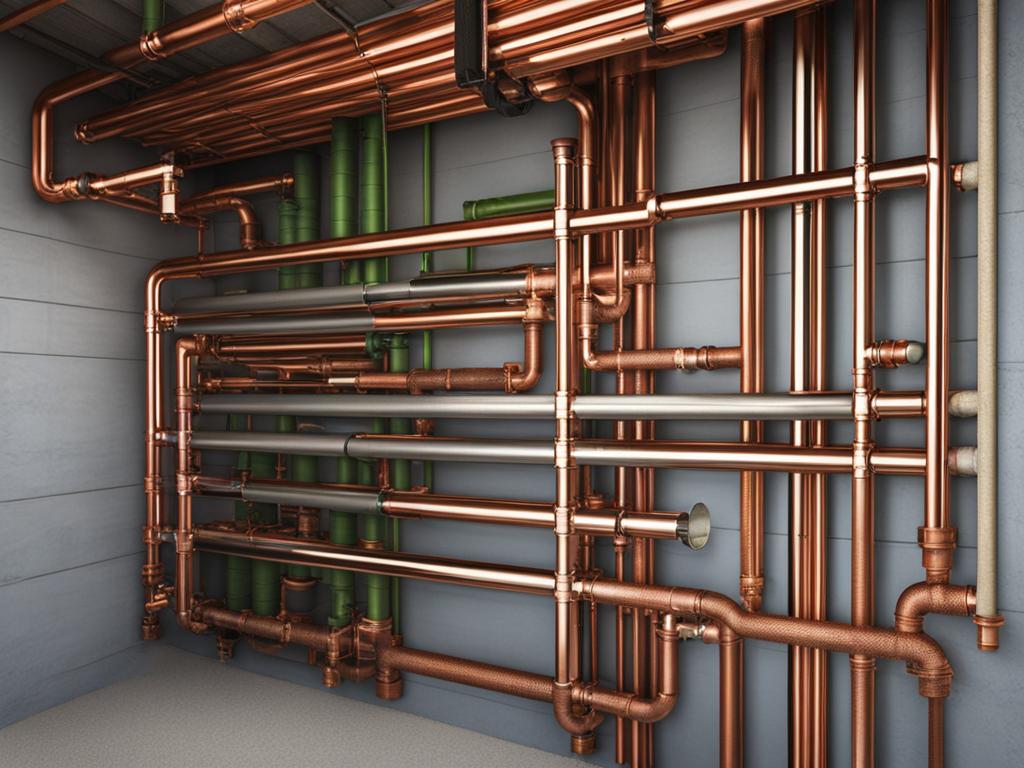
It’s important to consult with a professional plumber to determine the most suitable pipe material for your repiping project. They can assess your specific needs and provide guidance on the best options available.
Signs You Need Repiping
If you’re experiencing any of the following signs, it may be an indication that your house needs repiping:
- Frequent leaks
- Low water pressure
- Discolored water
- Outdated or corroded pipes
These signs can be a result of aging pipes, deterioration, or other underlying issues in your plumbing system. If left unaddressed, these problems can lead to more significant damage and costly repairs down the line.
By recognizing these signs early on, you can take proactive steps to repipe your home and prevent further issues. But how do you determine the potential cost involved in such a project?
Using a House Repiping Cost Calculator
A house repiping cost calculator can help you estimate the potential expenses of repiping your home. These online tools take into account factors such as the size of your house, the number of fixtures, and the type of pipe material to provide you with a more accurate estimate.
With a house repiping calculator, you can have a better understanding of the plumbing repiping cost and plan your budget accordingly. It is crucial to factor in this expense to ensure the longevity and reliability of your home’s plumbing system.
Consulting a Professional Plumber
While a house repiping cost calculator can provide you with an estimate, it’s essential to consult with a professional plumber for an accurate assessment. A plumber will assess the condition of your current plumbing system, identify any underlying issues, and recommend the best course of action.
Additionally, a professional plumber can guide you through the repiping process, select the appropriate pipe material, and ensure the work is done efficiently and to code. Hiring a reliable plumber will ensure a successful repiping project and give you peace of mind.
Now that you understand the signs that indicate the need for repiping and the importance of using a house repiping cost calculator, it’s time to take action if your home’s plumbing system is showing signs of deterioration.
Pros and Cons of Repiping
Repiping a house comes with its own set of advantages and disadvantages. It’s essential to weigh the benefits and drawbacks before making a decision. Here are some pros and cons to consider:
Advantages of Repiping a House
- Resolves Plumbing Issues: Repiping can effectively address recurring leaks, low water pressure, and other plumbing problems that compromise the functionality of your water supply system.
- Improves Efficiency: By replacing outdated or corroded pipes, repiping can enhance the efficiency of your plumbing system, resulting in better water flow and improved water pressure.
- Enhances Water Quality: New pipes can help eliminate issues such as discolored water or strange odors, ensuring clean and good-quality water throughout your home.
Disadvantages of Repiping a House
- Costly Process: Repiping can be a significant investment, with costs varying depending on factors such as the size of your home, the materials used, and the complexity of the project.
- Disruption to Home: In some cases, repiping requires access to walls, floors, or other structural elements, causing temporary inconvenience and potential disruption to your daily routine.
It’s important to carefully consider the cost implications and potential disruption before opting for repiping. While it can solve plumbing issues and improve the efficiency of your water supply, it’s essential to balance the benefits against the drawbacks and make an informed decision.
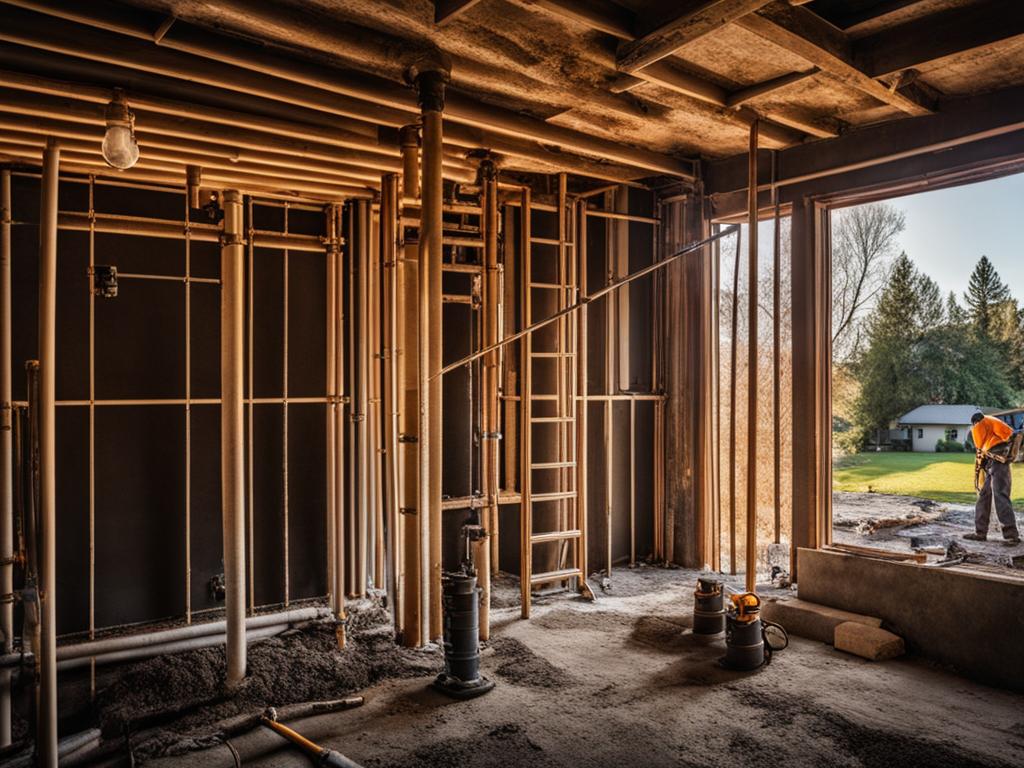
Using a repiping cost calculator can help you estimate the expenses involved, giving you a clearer picture of the financial commitment required. However, it’s important to keep in mind that the exact cost to repipe a house can vary depending on various factors, such as the size of your home, the number of fixtures, and the type of pipe material used.
DIY vs. Hiring a Professional
When it comes to repiping a house, homeowners often face the decision of whether to take on the task themselves or hire a professional plumber. While DIY repiping may seem like a cost-effective solution, it is important to consider the complexities involved and the potential risks that come with it.
Repiping a house is a complex task that requires plumbing expertise. Professional plumbers possess the necessary skills and experience to ensure the job is done correctly and up to code. They are trained to handle the intricacies of the plumbing system and understand the potential challenges that may arise during the repiping process.
Attempting to repipe your house without the proper knowledge and skills can lead to costly mistakes and even cause damage to your home’s plumbing system. Inadequate installation or incorrect connections can result in leaks, reduced water pressure, and other plumbing issues that could require costly repairs down the line.
Moreover, professional plumbers have access to specialized tools and equipment that are essential for a successful repiping project. They are acquainted with industry best practices and are equipped to tackle any unforeseen complications that may arise during the process.
By hiring a professional, homeowners can also benefit from their expertise in choosing the right materials for the job. Plumbers have knowledge of different pipe materials, their pros and cons, and can recommend the most suitable option based on the specific needs and budget of the homeowner.
Hiring a professional plumber not only ensures a high-quality repiping job but also provides peace of mind. Homeowners can rest assured that the work is being handled by a trained professional who will prioritize safety, adhere to building codes, and deliver satisfactory results.
While the cost of hiring a professional plumber may be higher than a DIY approach, it is essential to consider the long-term implications. Investing in expert plumbing services can potentially save homeowners from expensive repairs, water damage, and the stress associated with an improperly executed repiping project.
Ultimately, when it comes to repiping a house, it is advisable to prioritize the expertise and reliability of a professional plumber. Their knowledge, skills, and access to necessary tools ensure a smooth and successful repiping process, providing homeowners with the peace of mind they deserve.
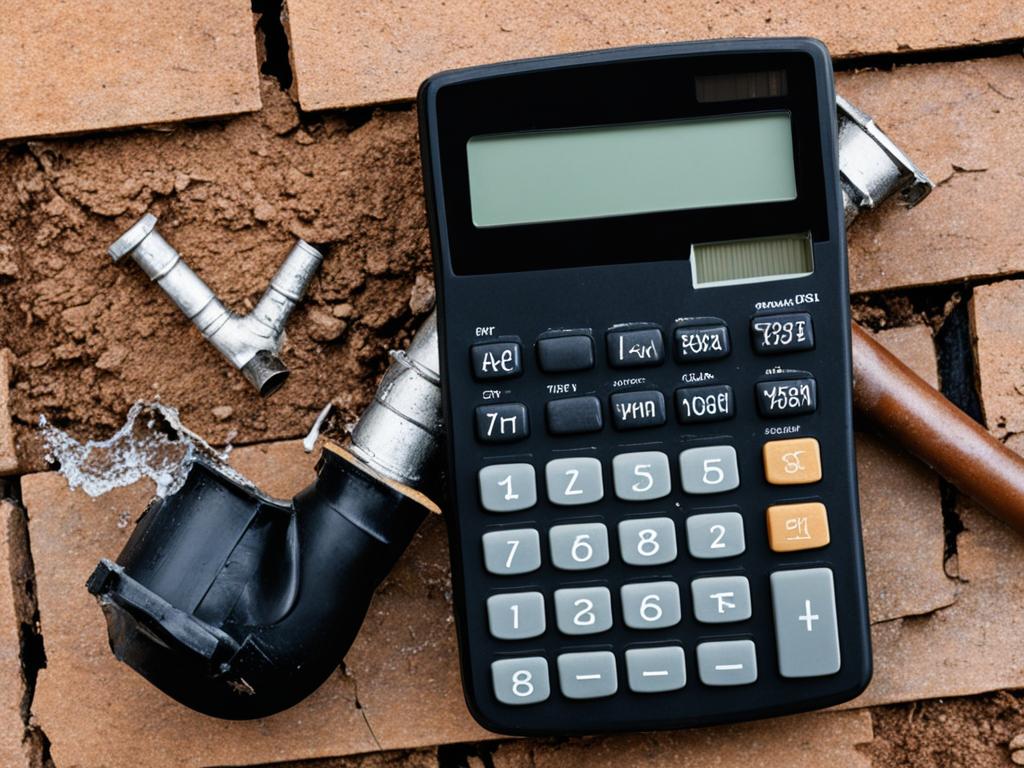
| DIY Repiping | Hiring a Professional Plumber |
|---|---|
| Requires plumbing expertise and knowledge of the plumbing system | Brings trained professionals with specialized skills and experience |
| Potential for costly mistakes and damage to the plumbing system | Ensures a high-quality and correctly executed repiping job |
| Limited access to specialized tools and equipment | Has access to necessary tools and equipment for a successful project |
| May lack knowledge of suitable pipe materials for the project | Provides expert advice on choosing the right materials |
| Less likely to adhere to building codes and safety standards | Prioritizes safety, building codes, and industry best practices |
| Potential for additional costs due to errors or complications | Minimizes the risk of costly repairs and complications |
Understanding the Cost Estimate
When receiving a cost estimate for repiping, it is important to understand what factors are included in the price. The estimate should cover materials, labor, any necessary permits, and any additional costs for repairs or replacements. It is also helpful to ask for a breakdown of the estimate to see how much each component contributes to the total cost.
Importance of Proper Inspection
Before proceeding with the repiping project, it is essential to have a thorough inspection of the plumbing system. A professional inspection can identify any underlying issues or potential problems that may need to be addressed during the repiping process. It can also help determine the scope of the project and provide a more accurate cost estimate.
During the inspection, a qualified plumber will assess the condition of the existing pipes, fixtures, and connections. They will check for any signs of leaks, corrosion, or damage that could impact the effectiveness of the repiping. By identifying these issues upfront, they can be addressed before the new pipes are installed, avoiding future complications and additional costs.
The inspection can also help determine the most suitable materials and techniques for the repiping project. Depending on the age and condition of the existing plumbing system, different materials may be recommended to ensure better durability, water flow, and overall performance. This information will be crucial in developing an accurate cost estimate that takes into account the specific needs of your home.
Benefits of Professional Inspection:
- Identifies hidden problems: A comprehensive inspection uncovers any concealed issues that might not be evident on the surface, such as leaks or pipe deterioration.
- Ensures a tailored approach: By understanding the unique characteristics of your plumbing system, the inspection allows for a customized repiping plan that best matches your home’s requirements.
- Provides a precise cost estimate: By assessing the condition of the existing pipes and identifying any necessary repairs or replacements, the inspection helps formulate a precise cost estimate that factors in all potential expenses.
Investing in a proper inspection is a proactive step that can save you time, money, and headaches in the long run. It ensures that your repiping project is based on accurate information and addresses any underlying issues that may hinder the effectiveness of the new plumbing system.
Sample Table: Comparison of Inspection Findings
| Issue | Severity | Recommended Action |
|---|---|---|
| Corroded pipes | Moderate | Replacement of affected pipes |
| Leaking connections | Minor | Repair or resealing of connections |
| Low water pressure | Severe | Possible need for additional booster pump |
The table above illustrates a sample comparison of inspection findings and the recommended actions that may arise from the assessment. These findings help inform the repiping process and provide valuable insights into the scope and estimated cost of the project.
By prioritizing a proper inspection, you can ensure that your repiping project is carried out with precision, resulting in an efficient and reliable plumbing system for years to come.
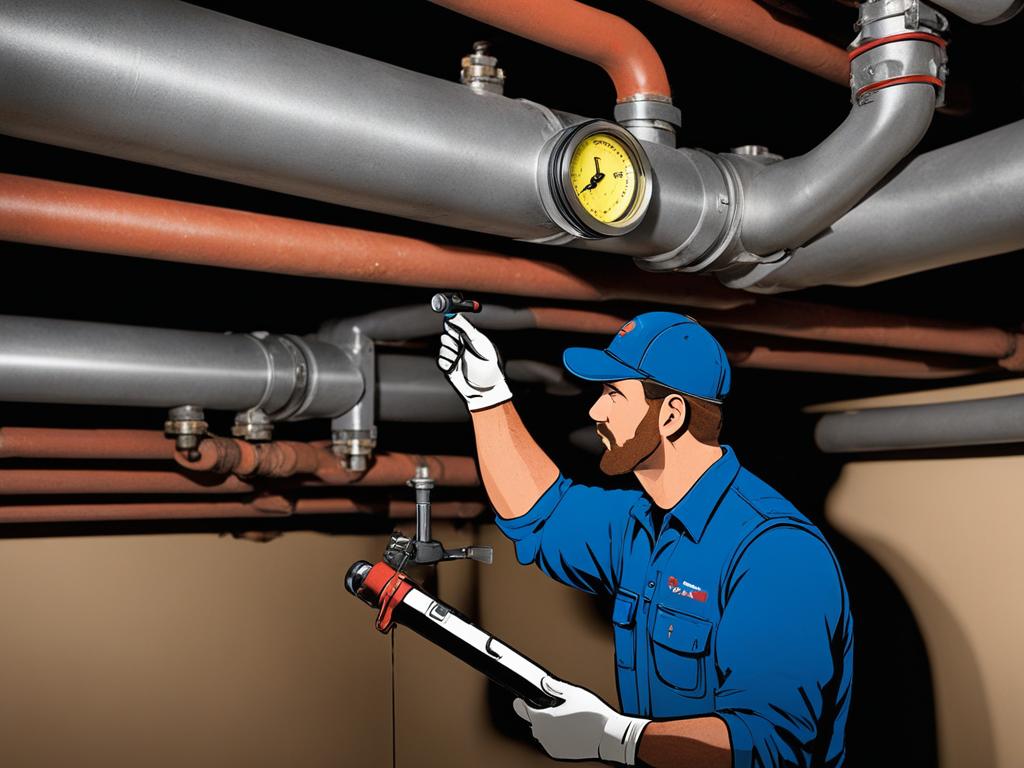
Additional Costs to Consider
In addition to the main repiping costs, there are other expenses you need to factor in when budgeting for a repiping project. These additional costs can vary depending on the specific requirements of your home and the condition of your plumbing system.
One potential additional cost is the need for repairs or replacements of other plumbing components. During the repiping process, it is possible to discover issues with sewer lines or water mains that may require attention. Addressing these issues alongside the repiping work can ensure the overall integrity and functionality of your plumbing system.
Another factor that can contribute to the overall cost is obtaining the necessary permits. Depending on your location, you may need to obtain permits from the local authorities to carry out the repiping project. These permits often come with associated fees, which should be included in your cost estimation.
Additionally, the disposal of old plumbing materials should be considered. When repiping your house, the old pipes, fittings, and other materials will need to be removed and properly disposed of. The cost of hiring a waste disposal service or renting a dumpster should be taken into account.
Summary:
When budgeting for a repiping project, it is essential to consider not only the main repiping costs but also the additional expenses that may arise. Repairs or replacements of other plumbing components, permit fees, and the disposal of old plumbing materials are some of the factors that can contribute to the overall cost. By accounting for these additional costs, you can ensure that you have a comprehensive understanding of the financial implications of your repiping project.
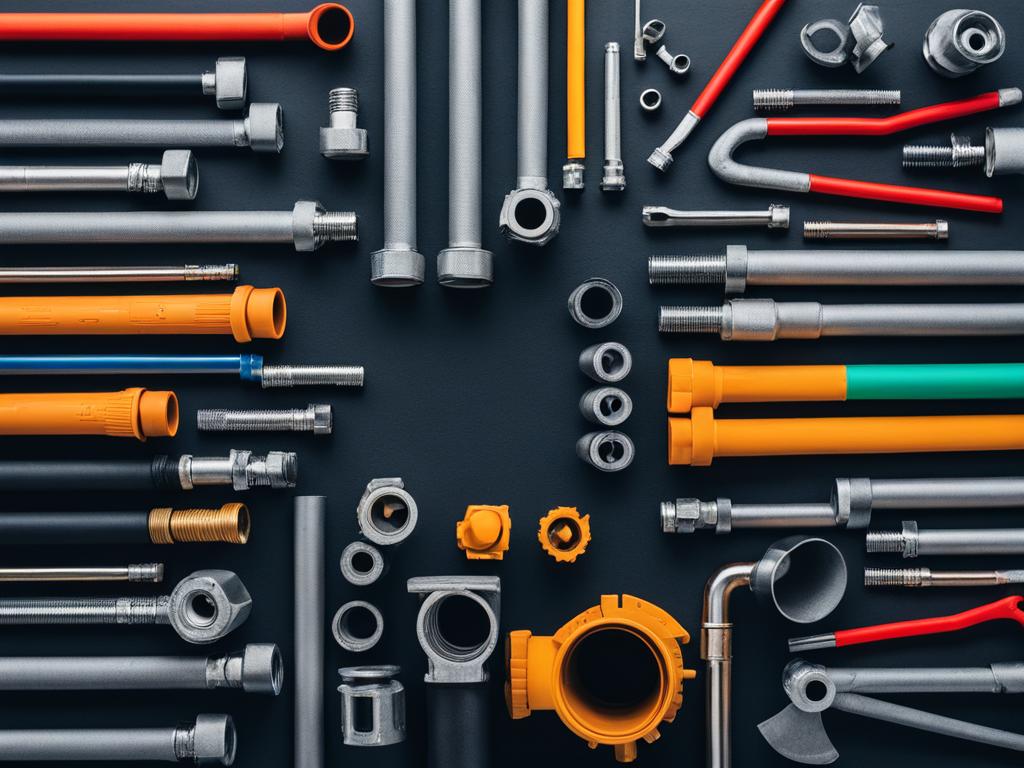
| Additional Costs to Consider | Estimated Cost Range |
|---|---|
| Repairs or replacements of other plumbing components | $500 – $5,000 |
| Permit fees | $100 – $500 |
| Disposal of old plumbing materials | $200 – $500 |
Finding a Reliable Plumber
When it comes to repiping your house, finding a reliable and experienced plumber is crucial. This ensures that the job is done correctly and efficiently, giving you peace of mind and saving you from potential headaches down the line.
So how do you find a trustworthy plumber for your repiping project? Here are some steps you can take:
- Ask for Recommendations: Start by asking friends, family, or neighbors if they have worked with any plumbers they can recommend. Personal referrals can provide valuable insights and give you confidence in the plumber’s abilities.
- Read Reviews and Testimonials: Research online for reviews and testimonials from previous customers. This can give you a better understanding of the plumber’s reputation and the quality of their work.
- Check Licensing and Insurance: Ensure that the plumber you hire is properly licensed and insured. This protects you in case of any accidents or damages that may occur during the repiping process.
- Obtain Multiple Quotes: Reach out to different plumbers and request quotes for your repiping project. This allows you to compare prices and services to ensure you are getting the best value for your money.
Key Considerations when Hiring a Plumber
| Consideration | Description |
|---|---|
| Licensing and Insurance | Ensure the plumber is licensed and insured to protect yourself from liability. |
| Experience and Expertise | Look for plumbers with extensive experience and expertise in repiping projects. |
| References and Reviews | Check for references and read reviews from previous customers to gauge the plumber’s reputation. |
| Transparent Pricing | Choose a plumber who provides a clear and detailed breakdown of the costs involved. |
| Communication and Professionalism | Select a plumber who communicates effectively and demonstrates professionalism throughout the process. |
By following these steps and considering the key factors outlined in the table, you can confidently choose a reliable plumber who will handle your repiping project with the expertise it deserves.
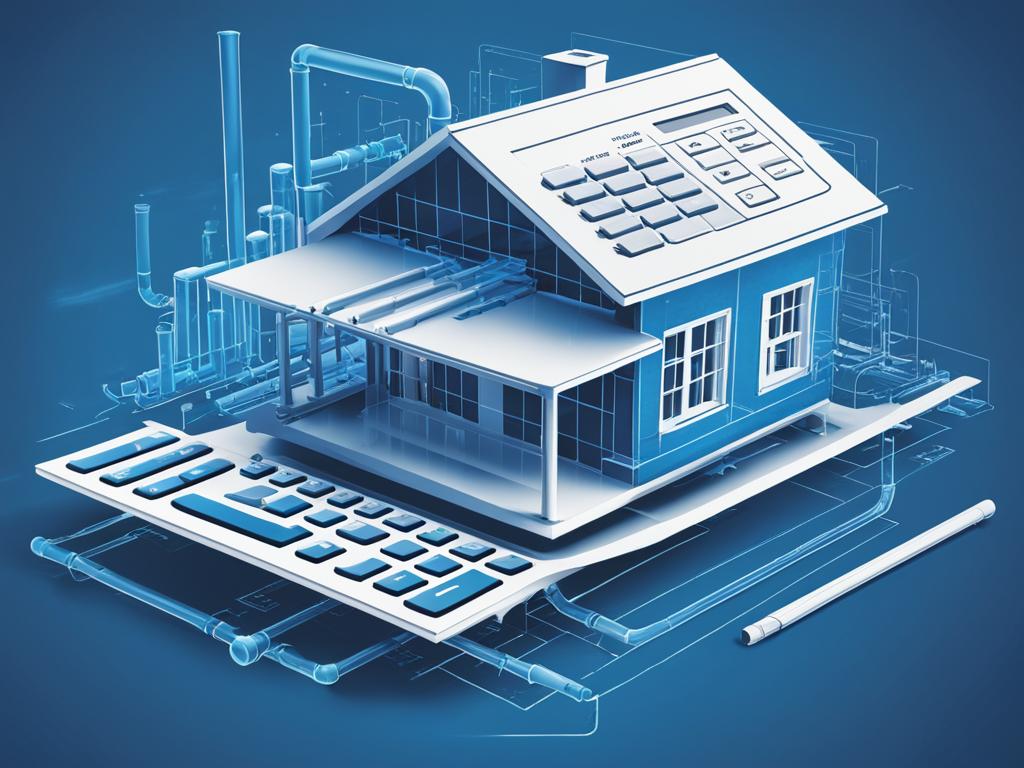
“A reliable plumber is like a trusted partner in your repiping journey. Take the time to find someone who will deliver exceptional workmanship and make the process as smooth as possible.”
Benefits of Repiping
While repiping can be a significant investment, it offers several benefits. These include improved water quality, increased water pressure, and the prevention of costly water damage due to leaks or pipe failures. Repiping can also increase the value of your home, making it a worthwhile investment in the long run.
When you choose to repipe your home, you are ensuring that your water supply is clean and free from impurities. Old pipes can accumulate rust, debris, and mineral deposits over time, leading to poor water quality. By replacing these pipes, you can enjoy fresh, clean water for drinking, cooking, and bathing.
Another advantage of repiping is the improvement in water pressure. Aging pipes may develop leaks or become clogged, resulting in reduced water flow and pressure. This can make everyday tasks like showering or washing dishes frustrating and time-consuming. Repiping your home can restore optimal water pressure, allowing you to enjoy a smooth and efficient water supply.
One of the most significant benefits of repiping is the prevention of costly water damage. Old and corroded pipes are more prone to leaks and bursts, which can result in extensive water damage to your home’s structure, walls, and belongings. By repiping, you eliminate the risk of these costly and disruptive incidents, saving you money in the long term.
Additionally, repiping your home can increase its value. Potential buyers are more likely to be attracted to a property that has a fully updated and reliable plumbing system. By investing in repiping, you are enhancing your home’s appeal and marketability, potentially leading to a higher resale value.
Remember, the cost of repiping will vary depending on factors such as the size of your home, the materials used, and the complexity of the project. It’s important to use a house repiping cost estimator or consult with a professional plumber to get an accurate estimate tailored to your specific needs.
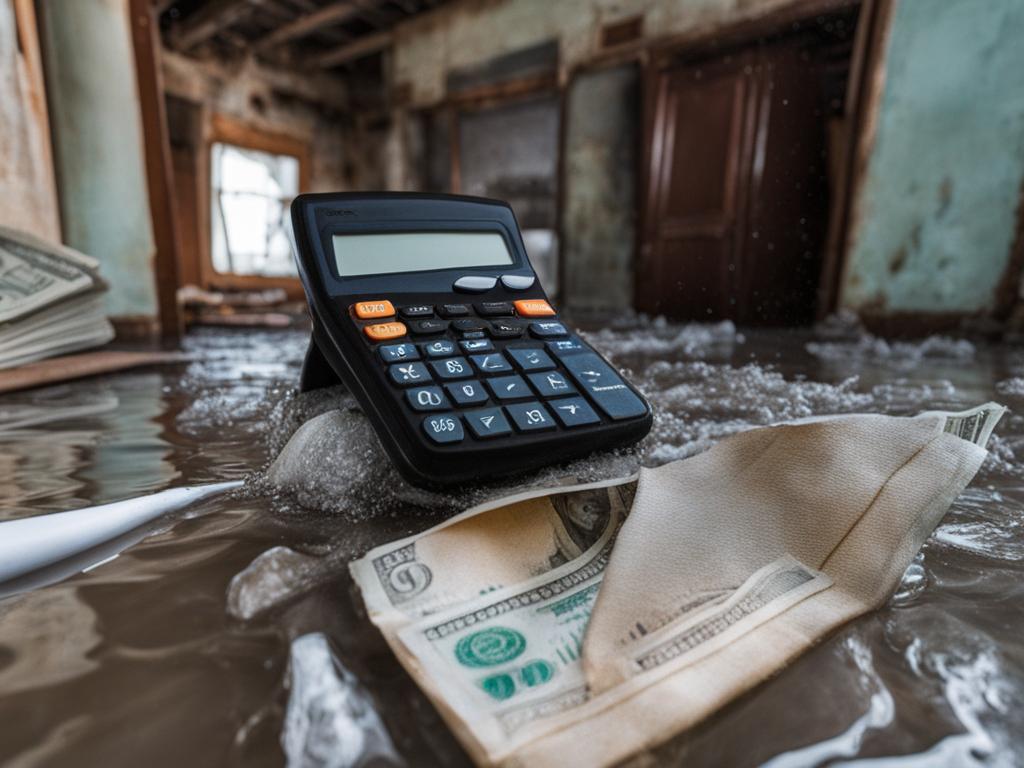
Benefits of Repiping:
| Benefits | Description |
|---|---|
| Improved water quality | Repiping removes old, rusted pipes, improving the overall water quality in your home. |
| Increased water pressure | Repiping eliminates obstructions and leaks, restoring optimal water flow and pressure. |
| Prevention of water damage | New pipes reduce the risk of leaks and bursts, preventing costly water damage to your home. |
| Increased home value | Repiping enhances your home’s appeal to potential buyers and can increase its resale value. |
Conclusion
Repiping a house is a necessary expense for homeowners who want to maintain the integrity and functionality of their plumbing system. The cost to repipe a house can vary depending on factors such as the size of the house, the materials used, and the number of fixtures. To get an accurate estimate tailored to your specific needs and budget, using a house repiping cost calculator is essential.
When considering the cost to repipe a house, it is important to take into account the factors that can affect the overall cost. These factors include the size of the home, the number of plumbing fixtures, the location of the pipes, and the type of pipe material used. By considering these factors and using a reliable house repiping calculator, you can better understand the potential cost involved.
Hiring a professional plumber is crucial when undertaking a repiping project. A reliable plumber has the necessary skills and experience to ensure the job is done correctly and to code. Additionally, they can provide an accurate cost estimate that includes not only the materials and labor but also any necessary permits and additional costs. By finding a trusted plumber, you can have peace of mind knowing the repiping project will be handled efficiently and professionally.
In conclusion, repiping a house is a significant investment, but it offers several benefits such as improved water quality, increased water pressure, and the prevention of costly water damage. By using a house repiping cost calculator, considering the factors that affect the cost, and hiring a reliable plumber, you can make informed decisions and ensure the long-term functionality and value of your home.
FAQ
What is the cost to repipe house water supply lines?
The cost to repipe house water supply lines typically ranges from $3,281 to $3,924 per job.
What factors can affect the cost of repiping a house?
Factors that can affect the cost of repiping a house include the size of the home, the number of plumbing fixtures, the location of the pipes, and the type of pipe material used.
What is the average cost to repipe house water supply lines?
The average cost to repipe house water supply lines is approximately $3,602 per job.
What is the cost of materials and labor for repiping a house?
The cost of repiping a house includes both materials and labor. The materials typically account for a portion of the total cost, while labor costs can vary depending on the complexity of the job and the plumber’s hourly rate.
What types of pipe materials are used for repiping?
The types of pipe materials used for repiping include copper, CPVC, and PEX.
What are the signs that indicate the need for repiping in a house?
Signs that indicate the need for repiping in a house include frequent leaks, low water pressure, discolored water, and outdated or corroded pipes.
What are the pros and cons of repiping a house?
The main advantage of repiping a house is resolving plumbing issues and improving the functionality and efficiency of the water supply system. The main drawback is the cost and potential disruption of the process.
Should I hire a professional or do DIY repiping?
It is generally recommended to hire a professional plumber for repiping a house. DIY repiping can lead to costly mistakes and potential damage to the plumbing system.
What factors should be included in a cost estimate for repiping?
A cost estimate for repiping should include materials, labor, permits, and any additional costs for repairs or replacements.
Why is a thorough inspection important before repiping a house?
A thorough inspection can identify underlying issues or potential problems that may need to be addressed during the repiping process and provide a more accurate cost estimate.
What additional costs should be considered for a repiping project?
Additional costs to consider for a repiping project may include repairs or replacements of other plumbing components, permits, and disposal of old plumbing materials.
How can I find a reliable plumber for repiping my house?
Consider asking for recommendations from friends, family, or neighbors and read reviews or testimonials from previous customers. Obtain multiple quotes to compare prices and ensure you choose a reliable professional plumber.
What are the benefits of repiping a house?
The benefits of repiping a house include improved water quality, increased water pressure, and the prevention of costly water damage due to leaks or pipe failures.

